#whose job it is to just float around and have other characters exposition at her
Explore tagged Tumblr posts
Text
Ever just kill an entire child offscreen just so you can re-set a character to their early season one state but this time without their Mysterious Secret In Their Past?
#Julian Fellowes sure as fuck did.#They could have had a whole season of Peggy searching for her son???#and then a storyline of getting him back or trying to find a way to build a bond with him without ripping him from the security#of the only family he knows?#but let's have all that drama happen off fuckin screen#and plop her back on E 61st#because god fucking forbid we have any scenes that don't revolve around the white households#you've got powerhouses Denée and Audra dominating their miniscule scenes but then just have to waste another half an hour on Marian#whose job it is to just float around and have other characters exposition at her#and be a clotheshorse#(they're great clothes but PEGGY LOOKS HOT TOO WHEN ARE WE GETTING AN EVENINGWEAR LOOK FOR PEGGY???)#The Gilded Age#spoilers
16 notes
·
View notes
Text
BNHA Rewatch: Two Heroes
mysterylover123
And before we start Season 3, one more road stop: The Big Freaking Movie, Two Heroes, last year’s surprise anime blockbuster and HeroAca’s first excursion onto the big screen. Time to share my thoughts and rewatch this very entertaining film!
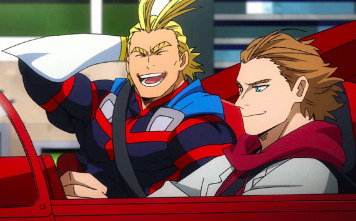
We open with bald eagles, deserts, and cowpoke themes, to make sure we know we’re in America. We fly into “California” which looks more like Las Vegas (not really complaining, I loooove that they picked my hometown state for this) to find young, white schlera eye-having All Might and his hunky bro David Shield kicking ass and taking names. My state’s name, to be precise.
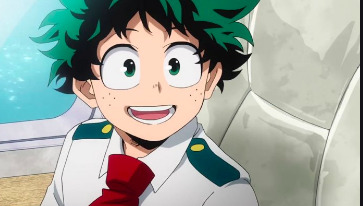
Some exposition follows, basically recapping the premise of HeroAca, as I’m reminded of what a stroke of genius Hori had when he decided to make the MC an easy expositor thanks to his geeky knowledge of all things Hero. Deku will always be Captain Exposition.
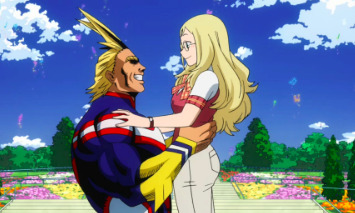
Melissa! She’s fun and adorable and amazing, and I just love that the first HeroAca movie chooses to focus on a geeky, kind and energetic lady.
Deku looking back and forth between Melissa’s breasts and All Might’s crotch belt is peak Bi energy.

I’m so jealous that Melissa gets to touch Deku’s hand.

Melissa describing All Might as someone David ‘loves’ is just throwing away all pretence of his heterosexuality, if it ever existed. How the hell did this guy end up with a kid?

Deku blushing around and enthusing over both Melissa and David is max bi energy.

Uraraka’s Annoying Crush Counter: 5
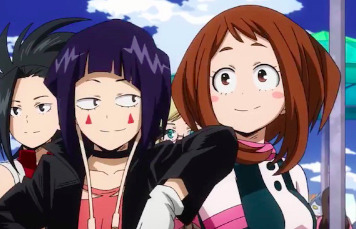
But I’m glad the girls are here! The Bones animators clearly know well what the fanbase wants to see, choosing to give all 6 class 1-A girls at least a cameo in the film, and three of them involved in the main plot. I especially love that, despite being initially pitted against each other, Uraraka and Melissa develop a bit of a womance in the film. OchaLissa ship!
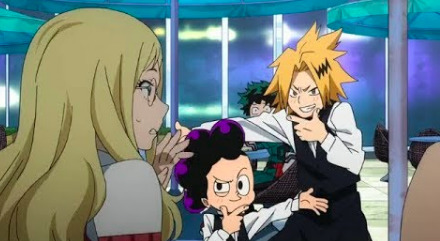
My one major regret about this film is that Mineta is included in the Main Cast. I wish either Mina or Tsuyu had come along for the ride instead - one, they’re better, more lovable characters who could do the same job he does, and two, then we’d have a nearly gender-even cast! (6 Boys: Deku, Katsuki, Tenya, Shoto, Kiri, Kaminari; 5 Girls: Ochaco, Momo, Jiro, Melissa, Mina or Tsu).
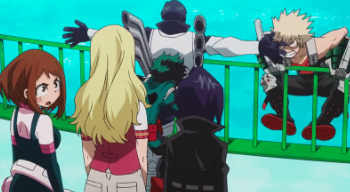
Kacchan makes his appearance! This bit was leaked online before the film’s release and drew quite a lot of ire from BKDK shippers and Bakugo fans. I’m mostly annoyed that Deku is acting OOC here; this is Post-Final Exam Deku, post Hero Killer Deku. Would the guy who punched All Might in the face and Bakugo in the face and the Hero Killer in the face be cowering in fear behind Iida, the guy whose life he saved, from the guy he, only a few weeks ago, punched in the face?! Badass Deku Rights!
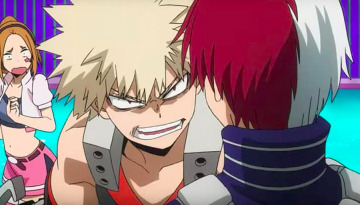
Ooh a wild Todobaku moment! I always love when they bicker. Or rather, Katsuki bickers and Shoto ignores him.
OH NO you cannot slap me with the Ingenium OST theme and hardcore feels out of nowhere! God this scene is heartbreaking. I love, however, the cut to the whole of Class 1-A and Melissa when they talk about the future.

AH Bakugo’s feet! Why are we staring up his crotch? So this movie has a lot of KiriBaku scenes, and I should probably talk about them a little, since their friendship is a big deal in S3. They’re the only major HeroAca ship I’ve never shipped as a romantic pairing, per se. Like, in this scene, I see Kiri as Katsuki’s wingman, his bro, the guy who teases him about his obvious feelings from someone, not as the guy he has feelings for.
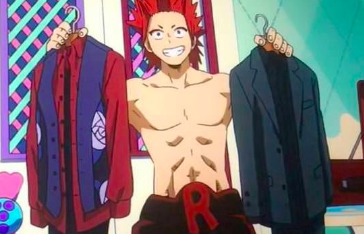
And for Kiri’s sake, I kinda dislike making him basically Bakugo’s sidekick. He willingly hangs out with the guy, when he wants to, in canon, he doesn’t follow him around and become the butt of the joke, and he has lots of other relationships in canon to draw from, so this dynamic between them doesn’t appeal to me.

Melissa being a quirkless kid like Deku is a great idea for the film, especially since she and David still find a way to help others. They’re a brighter image of the person Izuku could have been.

Full Gauntlet is pretty cool

Everyone dresses up pretty! The movie suits/dresses are awesome and (almost) everyone looks great. Why Deku is wearing a baggy zoot-suity mess is beyond me, but hey, he sheds it pretty quickly so I’m not complaining.
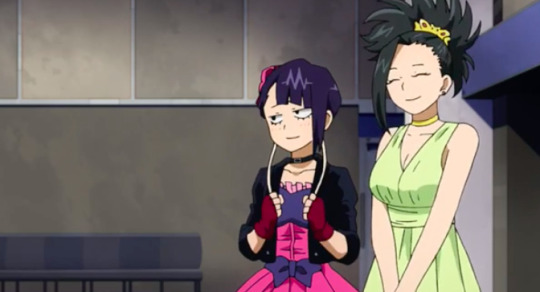
If by ‘female assassin’ you mean Beauty Queen. Jiro is gorgeous.

OK the plot ensues! Darn, I could’ve easily enjoyed a movie that was just everyone hanging out and goofing off...ah well, I still love what we got.
This villain does what neither Tomura nor All for One could ever do! Subdue All Might! My god he’s a criminal mastermind!
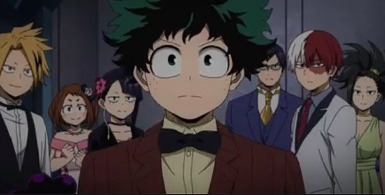
Deku wants to help, and everyone but Shoto basically piles on the bandwagon afterwards. “And me!” “And me!” “Me too!” “And Me” “Nobody cares Mineta.” I like how they bring up the Powers dilemma, since that’s a big deal in Season 3.
I was pretty impressed by the amount of level grinding our heroes had to do to make it to the top floor. 200 freaking floors, that’s impressive.

Todoroki saved Bakugo! Yay! BTW I love all the tactical planning stuff in this portion, and how lots of characters get to contribute.

10 little superheroes, trying to save the day. Two got lost and then there were eight.

8 little superheroes, escaping from the garden. One saved the others and then there were seven.
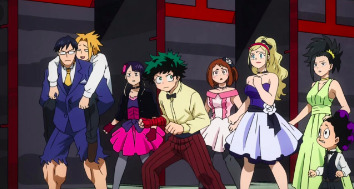
7 little superheroes running against the sea, four were trapped by robots and then there were three. (i don’t count mineta).
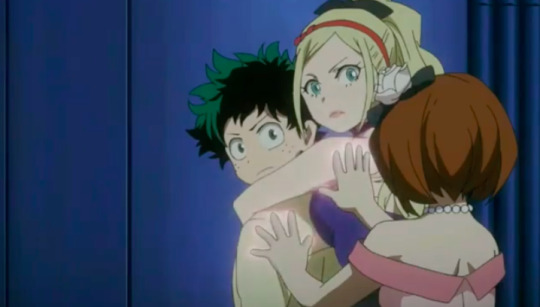
Three little superheroes, reached the top and flew; one had to float them so then there were two. (she’s fine, Bakugo saved her. Save to win!)
Two little superheroes, faced with a gun. One fell out the window and then there was - never mind, she saved him, he’s fine.
That was fun. Anyway, to sum, the group gets split up as they work to get to the top, leaving only Deku and Melissa to reach the final boss dungeon. Highlights include the usual Kamijiro bantering, Todobaku making an awesome combat move, Uraraka standing against the coming onslaught of robots in a weirdly dramatic scene, and Reciproburst.
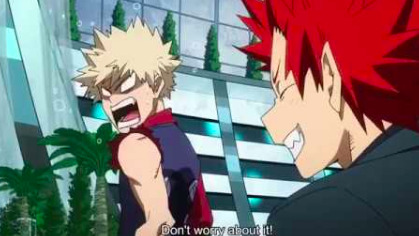
Dislikes include Kirishima being portrayed as not much use and kind of stupid (c’mon, he can do better than that!) and Uraraka not getting to kick any real ass other than floating Melissa and Deku.

So we make it to Dramatic Plot Twist Tower and find out that David set up the whole thing. I joke, but I actually didn’t see this coming the first time around and was genuinely surprised. I also think it fits really well with the story they’re telling here: about trying to hold onto the past and forgetting to look to the future. I usually measure good plot twists in terms of how they change the story, characters and themes, and this one does.
On the other hand, Sam betraying him is just kind of silly. “Oh no, not...that guy!”
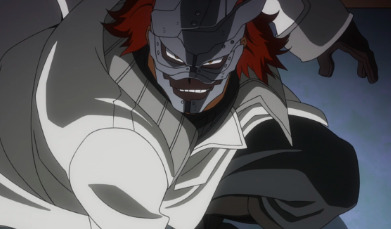
The villain being named Wolfram makes me wonder if there are any secret Buffyverse fans on Bones’ writing staff. With the next movie’s villain be named Hart?
I love how Melissa is a quirkless character who gets to save the day every bit as much as the powered ones. Also, Deku is freaking awesome in this scene, ngl. It has vibes of his fight with Muscular, that “pinned by an unstoppable wall” thing.

And this has vibes of Deku vs Overhaul trying to save Eri. OMG S4 IS GONNA KILL ME. Anyway Deku tries really really hard to save David Shield and does lots of cool leaps and gets beaten up while doing it, enough to earn some of Wolfram’s respect, but is unable to. Fortunately...
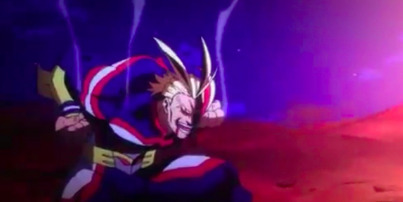
Watashi Ga Kita!
But then...duh duh duh! Wolfram has that power-enhancer-plot MacGuffin! Actually, it’s not a MacGuffin now, because now we the audience kind of care about it. It has weight, it’s significant. The characters care about it, but there’s more to it than just being an interchangeable object.
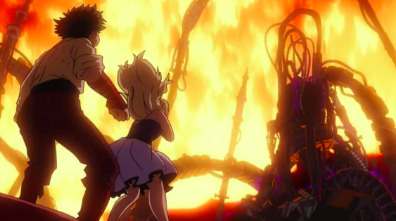
I LOVE how they animated the metal on this guy. That’s Metalbending. OMG.
Class 1-A showing up and kicking ass as always. I just wanna quibble for a second with how this movie uses Howitzer Impact: a giant mind-blowing explosion in manga canon, a small underwhelming fizzle here.
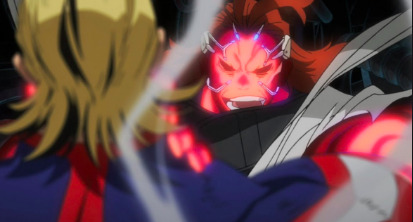
DUH DUH DUH DRAMATIC PLOT TWIST. Again this one floored me the first time around. My jaw actually dropped when AFO’s theme started playing. Holy crap WHAH How what how. I’m not as excited about this plot twist, as it basically just happens for the sake of being shocking, but hey, that is clearly something AFO would do, and I like seeing him and hearing his theme here anyway, so who cares. Just roll with it!
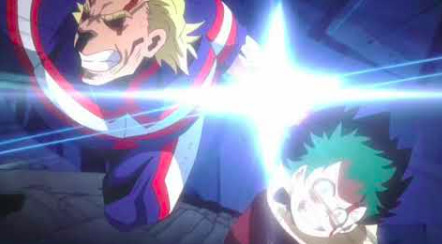
And now, the reason this movie was made and the premise behind it. We never, in the canon of the manga, actually get to see All Might and Deku fight the same villain at the same time, so the movie I think was made for that purpose: DOUBLE DELAWARE DETROIT SMASH + YSR

OH YOU SAY RUN. You could soundtrack a scene of people sitting around staring at the wall and turn it into the most epic thing ever. I will never get tired of this beautiful, peerless, impossibly good composition. And this is honestly one of my favorite YSR scenes, because dayum, you can’t get much cooler than the Double DD smash.

Visual storytelling here is on point. David Shield’s image of All Might turning into Deku is perfect.
We end on a sunrise, fittingly, and Long Hope Philia sountracked credits - with a small bit of depressing to end on, as we see David is probably gonna get arrested and All Might can’t do nothing about it.
Two Heroes is great. My quibbles with it are all minor. It’s the perfect first movie for BNHA; it is big and bombastic and action-packed, but more important, it gets what MHA is about at it’s core. BNHA is a story about the prior generation of heroes (and villains) passing the torch down to the next one. You know, like how teachers pass info onto their students in Academia. The movie gets that, and it delivers it with aplomb. It’s a great script, every scene and moment is necessary and everything happens in the right place and right order. It’s a thrill to watch, and I can’t even begin to imagine what insane stuff they’re gonna put in Movie #2 BKDK Boogaloo. Starting S3 tomorrow!
BKDK CORNER:

On a rewatch, I’m a little more OK with this scene, because Deku pretty quickly bucks up and takes the challenge - and he doesn’t exactly cower from Kacchan, Iida just gets in the way. I also love that gay sounding “Kacchan, people are watching!” line in the sub.
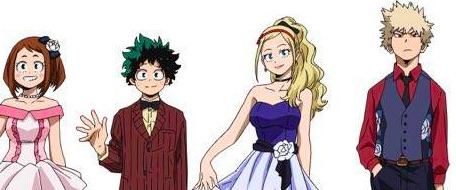
All of Deku’s Love interests where white flowers on their fancy wear.
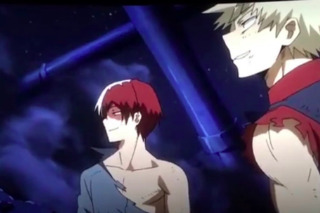
NGL this is my favorite part of the movie. That is the sweetest, softest, most endearing smile Bakugo has ever had, and Todoroki seeing it and smirking is just perfect. Baku is peak Tsundere in this scene.
RANKER: The Formal Wear
Girls:
4. Momo - I like the tiara, and the dress is kind of a nice color.
3. Melissa - pretty but a little birthday cake-y.
2. Ochaco - Very cute and well-tailored. The tights really sell it.
1. Jiro - unconventional is the winner of the day here.
Boys:
6. Izuku - Deku where the f did you get that suit? Take it off, please. Why is your taste in clothing so bad.
5. Kirishima - it’s ok, but a little generic.
4. Kaminari - the waiter look isn’t half bad on him
3. Iida - sharp dressed, of course. It looks nice!
2. Todoroki - perfectly handsome, and of course his suit is white.
1. Bakugo - that vest tho. damn.
#my hero academia#my hero academia two heroes#bnha movie#midoriya izuku#All Might#melissa shield#katsuki bakugou#katsudeku#bnha two heroes
50 notes
·
View notes
Text
TTDS: The Three Daughters of Sir Torture; Chapter 2
Torture Tower Doesn’t Sleep: The Three Daughters of Sir Torture infomine under the cut
Character Info:
Beritoodo (Beritoad): His animal form is a red toad.
Chenbaren (Chamberlain): A very wealthy merchant in Lion City (no first name given). He owned a coal mine that was found to have diamonds in it (which is where their wealth stems from). He capitalized on the wealth he’d gained to fund new business ventures that kept him rich even after the diamond mine was depleted. He has two kids he loves dearly, and in fact became bedridden from grief after his son grew ill.
Danii Chenbaren (Danny Chamberlain): The younger brother of the Chamberlain siblings, grown into a wise young man. He is the one slated to inherit his father’s business, but has recently fallen to illness (really Ian poisoning him) and given six months to live.
Ian (Ian): Cousin of Danny and Cynthia. He’s also the family doctor. He pretends to care very dearly for his family (and, uh, Cynthia in particular), but in point of fact is a backstabbing, poisoning, rotten scoundrel who was only interested in taking the family fortune for himself. He has a swept-back hairstyle. Claims he graduated from the best medical school in the country. Has pale white skin and an unmanly delicate frame.
Jibetto (Gibbet): Likes black tea, as she finds it calming. Her role is to kidnap new victims for the tower (also silly me, I just realized the cage thing that caught Lloyd is. Well. A gibbet). Wants to always have flowers around her, or else she’ll become depressed. She excels at being able to judge people’s true personalities, either as a result of her experience seeing people’s suffering, or as a talent she’s always had (she’s not sure which). The only one that sleeps. She’s also the most responsible (ex, doesn’t necessarily agree with Rack’s impractical, childish way of doing things but doesn’t say anything because she doesn’t want to impede on her role).
Meiden (Maiden): Often the one to undertake the tower’s repairs. A girl of few words. Apparently, she’ll lose the form she has if she were to leave the tower. Her job is to kill prisoners once they are broken beyond the point of suffering. Doesn’t sleep. The strongest of the girls (overpowered, really).
Rakku (Rack): Never sleeps. According to Gibbet, if she leaves the tower she’ll lose her current form. She’s usually the one to undertake the tower’s cleaning. She’s the one whose actually job it is to torture people. She has a very childish and sadistic personality, preferring to play with her prey to witness their suffering and fear.
Shinshia Chenbaren (Cynthia Chamberlain): Fun note, this can also be written as “sincere”. The eldest of Chamberlain’s children, and a beautiful young lady (she was very young during the Diamond Boom). Has no interest in her father’s business. She’s gotten to be a little bit too close with her cousin Ian (and by that I mean they act more like they’re dating than family, though nothing explicit is said outside of Gibbet’s observations).
Setting Info:
Daiyakeiki (Diamond Boom): Referring to a brief period of time when Lion City flourished with wealth as a result of Chamberlain’s diamond mine.
Rionshiti (Lion City): Has coal mines to the north of town. One of them was found to be a diamond mine, which made the city wealthy for a time until the mine dried up not a full decade later.
Toruchiatou (Torcia Tower): The fifth floor has 4 rooms. Two of them are locked, and the girls don’t have the key. One of the others is a storage room for the torture implements. And the other is a place of worship for their god (this is the one in the center of the floor), where the Pot of Basuzu is. To the right of the shrine are stairs leading to the roof. The tower is sort of infused with death—it kills things that are in it, such as flowers.
Notable Quotes:
“What’s…that…?” Not really a great quote, but it’s Cynthia’s last words.
Plot Summary:
Scene 1
A character (doesn’t say who but it’s Gibbet) is recalling that they’ve been dreaming about a boy and girl they don’t know, a field of flowers, and a bracelet made with a flower (flowers?).
Scene 2
Gibbet is having tea in Torcia’s place of worship. Rack comes down from the roof, and they chat a little, before Maiden shows up, having finished repairs. She tells them they’re almost out of quicklime, so Gibbet says she’ll buy some in town. They talk a little more before Gibbet finishes her tea and gets up to leave.
Beritoad’s voice calls to them from the shrine, informing them that a young man and woman are on the tower’s first floor. They have no weapons—only a hunting knife. People Gibbet talked to the other day at Stella’s bar.
Rack is disappointed—she’d wanted to cut loose with them, but they sound harmless. Though, that kind of thing is why Maiden had to do repairs. They talk a little more, and I think it’s established that Lloyd (they don’t say his name but still) escaped by blowing a hole in the wall and jumping out of it.
They talk a bit more, Gibbet expressing her contempt for humanity and conviction that they can’t stop them, etc. Beritoad’s voice confirms her convictions (they’re better than humans and their sacrifices only increase his and their power), and tells them to go on and get more sacrifices for him.
Scene 3
The girls go to the torture device storage room to select what they’ll use this time. The chapter is mostly exposition on who they are and their role—they just woke up in the storage room with no memory of who they were, and it was Beritoad (their “god”) who informed them that they were torture devices, that Hank was their “father”, that their job was to kill people after torturing them to increase Beritoad’s power to bring Hank back, etc.
They don’t know how they became human or anything like that, though.
Gibbet takes an iron mask for her tool.
Scene 4
This section has a lot of exposition on the Chamberlain family, which is mostly written above but papa Chamberlain calls Cynthia his most precious diamond b’awwww. It talks about how Danny fell ill, and Ian and Cynthia are desperately looking for a cure.
Three months in (ie, three months until Danny kicks it), she happens to meet Gibbet at Stella’s Bar, who tells her about the Pot of Basuzu. Gibbet promised to secretly share the water from the pot with her, hence what she and Ian are doing at the tower.
Scene 5
A little bit on Gibbet and flowers (her flowers wilt before they’ve even started drooping, despite constant care), and then on to her waiting for the intruders on the second floor. Cynthia is happy to see her, and they exchange pleasantries (they tried ringing the bell but no one answered so they came in) before taking them to the third floor to see the pot.
She waits for an opportunity to set the trap, seeing Rack looking down on them from the atrium hole. While feigning concern, she needles at Ian a little bit for fun (mostly on that he’s the only doctor who’s seen to Danny’s condition), having already guessed his true nature.
They talk a little about the tower’s architecture and its history as a torture tower (which upsets Cynthia). Soon enough they’re positioned right under the atrium hole in the ceiling, but Gibbet is stalled by feeling someone’s gaze on her (one that disgusts her more than the victim from the prologue looking at her boobs). It’s Ian.
Gibbet chooses now to spring the trap. Ian and Cynthia freak out as they suddenly have the metal masks that Gibbet chose earlier clapped on their faces (medieval torture pig masks, which make it so you can’t talk, hear, or see, though among all the devices in the tower these are the least painful and Gibbet only uses it every now and then because she feels sorry for it).
As a note, all the girls while inside the tower can summon torture devices at will.
As Gibbet is making them float up to the third floor, Rack leaps down from the hole in the ceiling, having lost patience. She’s using a cat-o-nine tails (whip with multiple heads and, unlike a real one, star blades on the ends) today, as Josephine “seems unwell”. Gibbet sets them down again, and Rack takes to whipping them.
She calls the “painting” that she makes on Ian’s back (blood and scratches) “Man of Budding Stardust” (星屑スターの萌え男, not too sure on the translation). She asks for Gibbet to take the masks off so she can see them suffering (even though they’re suffering more with them on).
With the mask off, Cynthia (who’s freaking out with no comprehension of the situation) runs to Ian’s side. Rack strikes again—but it hits Cynthia, as Ian used her as a human shield. The two of them run for the third floor, Rack leisurely following suit (she even starts counting to 10 like it’s a game of tag).
Scene 6
Now it’s like a game of hide-and-seek, with Rack looking through the rooms for the two. Rack asks Gibbet to wait by the stairs so that they can’t run back down to the second floor.
With nothing to do, Gibbet recalls the dream she had this morning, with the boy and girl and the flowers, etc. The boy in the dream is the one who made the bracelet, and gave it to the girl. He said something to her, but Gibbet doesn’t know what. She’s had the dream a lot lately, and is always irritated and disturbed when she wakes up from it. Beritoad said that Gibbet needing sleep is a penalty for being the one to go out of the tower.
Gibbet hears the sound of one of her flower pots shattering, and realizes that they’ve run up to the fourth floor. If they run into Maiden up there, she’ll kill them, which is bad because they’ve hardly been tortured yet.
Gibbet goes up to the fourth floor and finds Ian, stabbed and dead, and Cynthia covered in blood standing over him with a knife (the illustration does not show her covered in blood, so apparently Maruino has something in common with Ichika). Her makeup is running from tears, and she murmurs madly that she was deceived, that Ian was poisoning Danny, etc.
Gibbet summons a gibbet (described as a mass of wires unfurling into a cage) and catches Cynthia, who’s just babbling about Danny repeatedly. She’s wearing a crude wooden bracelet, possibly a present from Danny, which reminds Gibbet of her dream (specifically, the words “little brother” and “present”).
Scene 7
Gibbet realizes she’s lost consciousness, and Cynthia has escaped. While she’s wondering what the heck just happened, Rack shows up and chews her out for leaving her position at the stairs and for letting one of them die. Then they run to chase Cynthia.
Scene 8
Cynthia is pretty much out of it, having suffered such severe emotional trauma. Yet she pushes on, determined to get the Pot of Basuzu in order to save Danny. She’s reached the worship room (chapel perhaps might be a better word).
She finds the pot there. As she reaches for it, she hears Beritoad’s deep voice tell her not to touch it. She finds Beritoad’s toad form behind the altar, freaks out, trips, looks up, and sees something emitting light. She utters her last words and it (a blade) falls, decapitating her.
Scene 9
Maiden is the one who killed her, using a guillotine. Beritoad assures her she did the right thing, as humans aren’t supposed to enter the shrine. He also reassures her on her usefulness as the one who kills off their victims (even though she’s not as good at causing suffering).
Scene 10
Chamberlain’s grief when he learns that Cynthia and Ian went missing leads to an even worse decline of his health. Raymond visited a week later asking about them, and by chance met with Danny. He then recommended Benji to start attending on the family. Three weeks later Danny is recovering, and Chamberlain is no longer bedridden.
The scene opens on him expressing gratitude to them both. He asks Benji if he might become the new family physician, which Benji takes as an opportunity to segue into telling him how Ian had really been poisoning Danny for his inheritance. Then he leaves, promising to see Danny’s condition the day after tomorrow.
Raymond follows after him, and it’s revealed that Benji only did it to clear his bar tab. He asks Raymond if he’s an acquaintance of Cynthia’s, and he says no (though doesn’t elaborate why he’s looking for her then). Raymond declares his intention to look for her in Torcia Tower, which alarms Benji, despite Raymond saying it’s not his problem.
Benji says that he knows more about the tower than anyone else in town.
#god a part of me wants to translate it but I know I can’t with everything else#mothy has made the characters so interesting#and the torture isn't nearly as bad as i thought with all the euphemisms and vagueness#within my tolerance levels anyway#()torture tower doesn't sleep
12 notes
·
View notes
Text
Changing elements of existing characters; race, sex etc
I remember when the F4ntastic Four movie came out in 2015 (and seriously, F4ntastic? What is this, the 90’s again?) and we saw that the new Human Torch was… different. There was some concern, admittedly even from me, about this change. I mean, Johnny Storm is white, right? Why cast a black actor?
Well I could have let that slide without issue as long as they explained, even with just one sentence to not take up too much time, why his sister is white and him black. Yes, there could be a hundred-score reasons why, but it is unintuitive. Since then I have grown up and don’t mind nearly so much, but this “issue” comes up again and again. The new Doctor in Doctor Who is a woman and there has been rumour about a black James Bond floating around for a while. My favourite superhero died and there was a fuss when he was replaced by a black kid; Tony Stark let a black girl replace him as Iron Man (or whatever name she went by) and there was a fuss both times. Are you seeing the pattern?
Established heroes are being replaced by children!
I’m kidding.
But there is always a fuss when a beloved character is changed and I must admit, a black James Bond would bother me. A female James Bond would bother me; the first and least important reason is that James Bond is an established white male character and a lot of his stories would be different if he wasn’t. The other characters in his stories would treat him differently, he would have had different experiences and would not be the same person.
More importantly though, it’s kind of insulting (not to me mind, I’m a white male) that people seem to think that the James Bond brand is what’s needed to carry a black or female lead. Seriously, we already know that’s not the case, so make a brand-new character who fits your criteria. If you have the rights then put them in the same world as James Bond, sure. That could be fun.
A female Doctor doesn’t bother me because it works in-world; they established long ago that it was possible to regenerate into a different sex so it’s cool. It works.
It’s just a shame the writing was crap. Fingers crossed for the 2020 series.
There were rumours for a while that Spider-Man, no cross that, Peter Parker was going to be gay in an upcoming movie. This didn’t happen and I’m glad. I probably shouldn’t be but I am. See, I let a lot slide in comic book universes because there is the multiverse and as long as we don’t know which universe exactly the story is based in, there is nothing wrong with Peter being gay. But again, why not make a new character who happens to be gay?
Isn’t it offensive to think that a gay Spider-Man has to be the original?
This is where Miles Morales comes in. He’s not a black Peter Parker, he’s a brand-new character. And yes, you could say my above argument should apply here, after-all it’s still the Spider-Man brand. But Spider-Man is pretty unique in that there has generally only been Peter Parker. Yes there is Miguel O’Hara in the future and similar variants but many superhero mantles have been picked up by other characters, but Peter Parker is usually Spider-Man and no-one steps up to take his place if he dies or vanishes.
Except maybe Ben Reilly, Peter’s clone.
But even if he wasn’t unique, it wouldn’t matter. Do you know how many Spider-Women there have been? Including another of Peter’s clones?
So when the Peter Parker of the Ultimate universe dies, Miles Morales comes along and tries to pick up the slack. This is just comic book tradition, and it works. I like Miles Morales. He brings a freshness to the Spider-Man story; seriously, screw Uncle Ben I want to see more Uncle Aaron.
Speaking of Uncle Aaron, I was a fan of Prowler when it was still Hobie Brown under the mask, but multiverse so whatever.
So changes thanks to the multiverse is cool, as is taking up another hero’s mantle. What else am I okay with? Well for starters, if something is done well.
It seems a lot of Iron Man fans weren’t too happy with the Mandarin but, and maybe this is because I didn’t know a whole lot of Iron Man lore, I thought that the twist was amazing. That is how you do a trailer. They set up this mysterious terrorist (yawn) who was dominating the Middle East, only for that to be a façade for the real villain. As a twist this is not only amazing but was set up incredibly well.
And then there is Michelle Jones from Spider-Man: Homecoming who we discover is MJ right at the end. She is quite possibly as far from the MJ we know as is possible but then again, she isn’t Mary-Jane Watson. I really like what they are doing here, using an established character whose relationship with the hero pops up in nearly every iteration, to hint at future sub-plots without actually being the same character.
So I’ve been pretty positive about the idea of “changing” a character, so why am I bringing this up? Because it doesn’t matter how justified the change is, the execution can ruin it. Doctor Who is a prime example of this.
I was pretty excited to see a woman portray the Doctor because there is a lot in his (I use the male pronoun for a reason) character that you don’t often see in female characters. Matt Smith was amazing at portraying an old man in a young man’s body; he was a treat to watch. Tennant, Smith and Capaldi were all very good at showing a character who was old, who knew, and had experienced, far more than any human could match. He took the lead, got angry when he needed to and had a fire in his belly, a sliver of ice in his heart, usually hidden by a cheerful and possibly forced optimism.
To see that kind of female character would be new and awesome.
Instead we had infantile episodes more focused on preaching than actually telling a story. I don’t know if Whitaker can act, I don’t know if she is up to the job of being the Lonely God, because we didn’t get to see it. I’ve been watching the old episodes, by which I mean 1963 onwards and I’ve just revisited the 2005 onwards series’; two companions really has to be the maximum number of companions and if there is a third then they should be the Doctor’s equal. Otherwise the Doctor gets ignored.
River Song was never just a companion and while you could say that her presence detracted from his, it was in a good way that allowed the characters to bounce off of each other. In series 11 with Whitaker we saw more of Ryan and Graham’s relationship than we did the Doctor herself, that is when they don’t pause the episode to dump exposition onto the viewers (I’m looking at you, episode 3).
Of course as far as I’m concerned, the greatest sin occurred in the second episode: she gives up. The Doctor gives up. For no good goddamn reason. Okay so there is a reason. Her time-machine, which has been coming and going for centuries isn’t there at that very moment! She didn’t see it disappear, not to return for another hundred years; it just wasn’t there yet and she knew it was due any moment. What the fu-?!
Who is this woman? Certainly not the Doctor who chases away fleets of spaceships with a speech.

-what a speech-
How about another example? You may have heard of Spider-Gwen (don’t worry she doesn’t actually go by that name, that would be stupid), her series is based on Earth-65 as opposed to the mainstream series which is Earth-616 (who numbers these?). I don’t want to talk about her, although I totally could. I like her and what they wanted to do, even if the execution was poor. No, I’m bringing up the Earth-65 Captain America: a black woman called Samantha Wilson.
The agenda behind that can already be practically tasted but I prefer not to whine about such things and she seems okay as a character. My problem is that if she went through the same process as Steve Rogers, which she did, then why isn’t she ripped like Steve? Seriously, that guy is jacked in virtually every incarnation so why isn’t she? Because she’s a woman and thus her biology is different? I think it’s safe to say that that is BS and the only reason she isn’t covered in rippling muscle is because it wouldn’t look sexy.
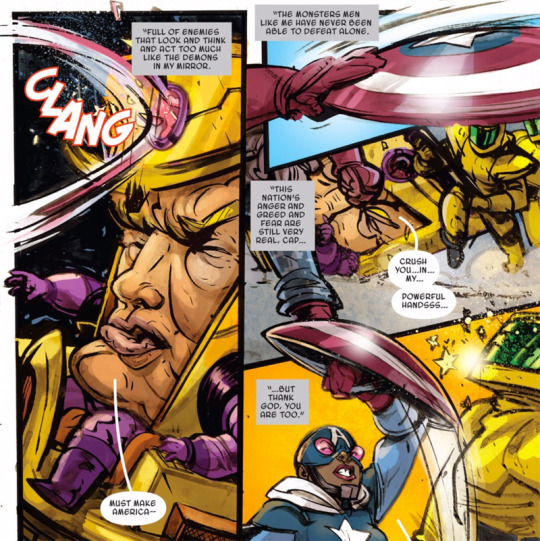
-seriously? Trump is Modok? He’s even quoting Trump! Urgh, the taste of agendas-
Men can be huge but women? Nope.
I don’t mind Gwen not being massive, depending on the artist then Peter can be pretty skinny too. But double-standards much?
I’m going to close up here. I don’t mind changes to established characters so long as it makes sense: taking up the mantle of a superhero, an alternate universe or possible in the established canon; I do however think that rather than changing an established character, a new character should be made. But while I often like to see these new (or sometimes “new”) characters, I will not force myself to like something if the execution is poor.
#first puffin#opinion#comics#comic books#doctor who#james bond#character design#agenda#race#sexuality#13th doctor#spiderman#spidergwen#miles morales#multiverse#f4ntastic#fantastic four#captain america#thosetagswilldofornow
11 notes
·
View notes
Text
The Light of Providence and the Spiral of Death: FFX and FFXV Compared
This is a pretty lengthy stretch of meta comparing FFX and FFXV’s attitudes toward death. Since that obviously ties into their plots, this will contain copious spoilers for both games.
The stories of FFX and FFXV do not remotely resemble one another. They do, however, in my opinion, contain parallel situations whose resolutions go in completely opposite directions. There isn’t anything particularly significant in that except that they are both major titles in the same series; I don’t know if they share any writers’ credits, but I would tend to assume not.
Both games depict sets of characters who’ve grown up in cultures that glorify self-sacrifice on behalf of a greater good. Their narratives, however, show wildly different depictions on the worthiness of that glorification.
These are not going to be brief rundowns, but I’m going to try to keep things simple. Like, I know one of the risks of being unsent in FFX is turning into a fiend, I know afterlife stuff happens in FFXV, but things like these are not really relevant to what I’m talking about. Yes, I am aware the main character in FFX also dies. But Tidus is not Noctis’s parallel in FFX; Yuna is.
So lemme start by laying out the cultural contexts we’re working within.
FFX: Just Don’t Climb Mountains with Corpses on Them. Don’t.
So Spira, the world of FFX, has a problem: it’s actually kind of hard to die. In fact, in some situations it might be impossible to die.
Okay, we don’t have to oversimplify: anyone can die in FFX. But unless a ritual undertaken by a specialist is performed immediately… not a whole lot happens when you die. You remain in the world of the living as something like a ghost, but you are for the most part indistinguishable from a living person. These ghosts are called “unsent,” due to the ritual performed for the dead being called “the sending,” as in sending them to the afterlife. Unsent can and do blend into the rest of the population and live relatively normal lives, not necessarily bothering anyone. Obviously, this is kind of fucked up, and no one wants to end up unsent or have their loved ones become unsent, so the sending ritual is treated as a matter of urgency… officially.
It almost goes without saying, then, that most of the people in positions of significant power in FFX are dead. Leaders hold onto their power by letting their deaths go unannounced and staying where they are, unsent. There are two examples in the game of massive unchanging power structures made up of unsent that exist solely to protect and perpetuate themselves. The game’s story is about how everyone who lives within the cultures that uphold these power structures ultimately suffer due to the people in power being unwilling to let go or accept change.
I know that’s a strange place to start explaining the religious atmosphere of FFX, but populating the upper reaches of power with undead incumbents is exactly the sort of situation where you’d want to weed out powerful up-and-comers. The religion itself – the worship of a figure named Yevon – dominates Spira’s culture, and it promotes faith to the point of such zealotry that people do actively seek to die for it. There a number of ways this works (Yevon is very complicated and you, reader, have presumably played FFX and do not need it explained in great detail), but we’ll focus on the two big ones: the fayth and the high summoners.
The fayth are people who have willingly had their bodies sealed within statues that worshipers form temples around and pray to. So first of all, they are officially sanctioned unsent. You can interact with ghostly versions of their human forms. Their primary method of interacting with the living world, however, and the reason they’d die in this horrible way to begin with, is that a fayth can take on the form of a fantastical and powerful creature which at that point is referred to as an aeon. The interchangeability of these terms varies; both the statue and the unsent ghosts are called fayth, but the dragons and the kirin and the fire demons and their ilk are always called aeons, even though the dragon and statue and ghost are all the same ‘person.’ I want try to avoid getting into these games’ weird vocabulary too deeply, but the distinction here is important when talking about summoners.
If you, hypothetical reader, have not played FFX but came across this essay and thought 'eh, fuck it,’ I respect that decision, and though you must be familiar with the summoning tradition in Final Fantasy as a franchise, you might be wondering why a strong religious culture would require people entombing themselves so they can become miserable unkillable fantastic beasts. You will probably not be surprised that this is where things get horrible.
The specialist mentioned earlier who needs to be called in to perform the sending for the dead is a role within Yevon called a summoner. Yes, like the summoners from almost every Final Fantasy game. Summoners train and work intensely with a fayth so they can form a bond that enables the summoner to call on the fayth’s aeon. Summoners are also the only people who can perform the sending, for… a reason, most likely. Becoming a summoner is a lot of work, though, and some villages lack any resident summoners at all, which is probably one reason there are so many dead people hanging around and getting away with it.
So that’s a summoner. Not all summoners are high summoners – in fact, there are only a handful of high summoners acknowledged in the game – but during certain cyclic periods of Spira’s history, all summoners want to become high summoners, or they come under a great deal of social pressure to attempt to become a high summoner. A high summoner’s job is to die.
The narrative that Yevon has embedded in its culture – and, to be fair, very much what appears at first to be going on – is that Spira is under a sort of curse that calls forth a massive sea monster unsubtly referred to as Sin. It appears without warning to destroy villages and ships; Spira consists of a number of small landmasses that contain a lot of coastline, so during the periods in which Sin is active, Spira’s population lives in constant terror. These periods of activity are not set to any kind of predictable system or cycle. Sin will vanish for years, and then it will just appear again one day. The only thing that can send Sin back into its temporary banishment is the most powerful aeon in Spira. This can be obtained by first earning the approval of a core set of the fayth (which itself involves walking most of the length of Spira, since the fayth are all located in regional temples), then climbing a mountain that kills most people who manage to make it that far, then getting into the dead city beyond the mountain and locating and praying to the fayth whose statue is unhelpfully based there, who will then hopefully grant you access to the aeon that can destroy Sin.
All of the other aeons have names – Valefor, Ifrit, Ixion, Shiva, Bahamut – but this one does not. It’s simply called the Final Aeon. It costs the high summoner his or her life to call on it - the high summoner doesn’t even get to see the fight - and then both Sin and the Final Aeon vanish.
The people of Spira believe the high summoners are laying down their lives to save everyone else’s, and they are granted the status of something like a saint in death. In actuality, the high summoner’s death sets off the conditions to begin the cycle of Sin eventually reappearing again.
But hey, we have to believe in something, right?
FFXV: The Once and Future Kings
So… FFXV has strange ideas about Christ figures. Not Xenogears strange, but… like, there’s official artwork strongly suggestive of the Triumphal Entry only there’s a chocobo instead of a donkey??
There is nothing in the story or setting that is actually thematically Biblical at all. JRPGs! What can you do.
This is going to be a little more difficult to lay out, because FFXV doesn’t really believe in things like backstory and exposition. Which I actually like in fantasy fiction, but it’s going to make explaining the self-serving power structure in this game a matter of interpretation here and there. Bear with me.
There are a number of regional cultures in Eos, FFXV’s loose floating jumble of continents, and none of them seem particularly religious. But they do have six gods, and they physically exist within the world. No one worships these gods, exactly. They are looked on with awe and respect and fear, but there are no organized religions around them that we see. This was a terrible oversight on the part of the ancient people of Eos, because these gods historically needed something to distract them from destroying everyone’s lives constantly. Eventually they all just agreed to go to sleep, I think.
But despite the lack of organized religion, Eos has an interesting figure known as the Oracle. There is only ever one Oracle at a time, and the role is passed down within one of the royal bloodlines. The Oracle’s power is that she can wake up the gods and speak and understand their speech, which is a great idea, probably.
The Oracle is a universally popular figure. During the game’s time frame the role is fulled by Lady Lunafreya, and the radio newscasts and newspapers you can find suggest a culture of celebrity worship of Lunafreya herself. She’s got other things going, like she’s a white mage and sorta princess, but the gods she’s supposed to commune with don’t seem to command much influence.
BECAUSE THAT’S WHAT THEY WANT YOU TO THINK we’ll come back to that
Anyway, the Oracle ties into The Prophesy. Yes, FFXV is a The Prophesy story. Everyone in FFXV knows The Prophesy. But there are also aspects of The Prophesy that you have to have explained to you by a rock or a dragon, so there’s The Prophesy and then there’s like The Gnostic Prophesy–
I really, really like FFXV. I do not The Prophesy stories. FFXV is a really bizarre example of a The Prophesy story, so honesty I kind of give it a pass. It’s just… okay, look
There are books scattered around the world that are parts of a cosmogony explaining bits of Eos’s mythology. The cosmogony explains that the gods picked the Oracle’s bloodline, and another magic bloodline kind of self-selected itself and established its own kingdom, Lucis, to whom the gods entrusted a supposedly wondrous but frankly pretty evil crystal; the royal family can tap into it kind of like a magic battery, so it does have its non-evil uses, but using that way drastically shortens the king’s lifespan, so… yeah, still pretty evil. This cosmogony also frequently mentions that someday the world will get dark and awful and then a king of light will make it better, yay, monarchism and a passing familiarity with Latin! It says it fancier than that, but that is pretty much all it says regarding any future bad times that I saw. This seems to be what people mean when they talk about The Prophesy, so most of the people in Eos can be forgiven for having no idea what that’s supposed to mean. Unfortunately, that does not include Lunafreya, who has one of the gods just like hanging out with her all the time, nor does it include the current King of Lucis, Regis, whom the crystal… talks… to? I don’t know, but when Regis’s son Noctis is five years old the crystal somehow tells Regis that Noctis is going to be the king of light. Oh, hey, guess how the king of light saves the world?
I’m doubly assuming that if you’re reading this you have played FFXV, so yeah, after two thousand words we are finally preparing the cabin for our final approach to my narrative comparison: he has to die.
Regis knows this. Lunafreya, a close childhood friend of Noctis’s, knows this. Noctis does not know this. Neither of them ever tell him. Noctis spends the game walking toward his death blind. And to make sure this point isn’t lost on you, it turns out that this isn’t the first time the conditions of The Prophesy, vague as they are, have been met. There was a king of light chosen by the crystal who predated Noctis by some two thousand years, and what happened to him was arguably worse than death. No one warned him, either.
The king of light is a venerated figure in Lucian artwork and poetry. He’s also a lamb for the slaughter. Even Christ got a heads up.
The Meta-narrative
“Meta-narrative” can mean about a dozen things depending on what school of postmodernism you’re incorrectly quoting, so I’ll be clearer: it’s the story that the story tells about itself. We know what these stories are both about, but how are they about them? The characters in FFX venerate and aspire to be as great as the high summoners, but what does the game itself think about what the high summoners have to do? What does FFXV think about what Noctis has to do? What are the games’ respective opinions of dying for a cause?
Well, that is of course up to interpretation. Neither fate is what can be comfortably regarded as a “good” death: the circumstances surrounding the high summoner and the king of light are very different, but in both cases they are lied to in order to put them where the real power of their respective worlds want them. Yevon wants to maintain the status quo to a degree that is obsessive and stagnant. The gods of Eos want to eliminate their own mistake, the previous king of light, which should tell you how much priority they’re giving The Prophesy.
I can’t speak on behalf of the culture that produced both of these stories, but I can say with some confidence that in Western culture we regard the concept of dying for the sake of others as a very noble calling. FFX has to make you look at that ideal from different angles to make its point about how much a single life sacrificed willingly can destroy the people left behind who didn’t get a say. It does this repeatedly: Wakka’s brother, Seymour’s mother, whichever of those two Crusaders you decided to doom, but it does so with the most impact when the game reveals the nature of the Final Aeon. There is no fayth in the ruined city. In order to obtain the most powerful aeon a summoner can call upon, they have to offer up the soul of one of their companions to be turned into a fayth.
What’s that? You’re balking at sacrificing a friend in order to save the world? But you were perfectly willing to sacrifice yourself! Your friend stood with you for your entire journey and is already mourning your impending death; going along with this plan is a way to follow you to the very end. It may even be seen as a relief from the burden of guilt and grief.
In order to become a martyr, you have to go through with murder. All the high summoners you’ve looked up to your entire life achieved what they did through killing someone they loved. Someone who had been willing to die for them every step of the way there.
The last high summoner had two companions with him on his journey. The surviving member of the party didn’t survive for very long. And with no one to perform a sending, he was left to become a ghost.
That is what FFX thinks of the nobility of suicide.
The Greater Good
FFXV’s situation is harder to make emotional sense of, not least because because the end of the game presents a scientific problem with a magical solution. The world has done dark because… parasites… release of light-absorbing particles into the atmosphere… yeah, human sacrifice ought to do the trick.
But let’s set the plot aside. The plot’s excuses for killing Noctis don’t literally matter, because, you know, The Prophesy. Ardyn has to die, Noctis has to die, and then Ardyn has to die extra, and thus the sun returns. But how does the story itself feel about this?
FFX never shows the audience how a person is turned into a fayth. It never shows us how the high summoner dies. But FFXV shows us Noctis’s suicide-by-summon in brutal, extended detail. We’re finally faced with Noctis at the edge of death begging the ghost of his father to kill him; Regis hesitates, and then he runs Noctis through. Regis kills Noctis. This can’t be a death we’re supposed to feel good about.
FFX is less interested in the deaths themselves than it is in their aftermaths. We don’t see the aftermath of Noctis’s death. We don’t know what his friends do after he dies. Noctis’s death is the end of the story; it’s the note FFXV decides to go out on. The story presents it as very sad, but also as the right thing for Noctis to do.
You can certainly make that argument considering the scale of what his death achieves. I believe that is what the game thinks, with its final shots of the sun rising over various game locations. Noctis was the only person who could do this, and he was strong enough to go through with it even though he emphatically didn’t want to.
Tidus basically ripped reality apart in order to save the next person slated to die as high summoner. He didn’t cry at their last campfire. He… well, he murdered his dad, look, FFX is complicated and deeply invested in its metaphors.
But it’s striking to me that none of Noctis’s friends try to brainstorm another way out of this. That’s the direction any other Final Fantasy game would have taken, so I suppose it’s to FFXV’s credit that it doesn’t do that. But have his friends really just… given up? None of them even declare they’re willing to continue to live in perpetual darkness for the sake of keeping Noctis now that’s he’s finally come back? Any one of the three has the background and motivation to at least suggest it, even if Noctis disagrees.
They cry for him, but they don’t believe they can save him. They grew up believing in the king of light that would save them.
The King Must Die
This is a question that can only be applied very broadly, because both games have their individual answers, but I find it interesting and am therefore ging to pose it anyway: why, on a thematic level, is Yuna spared and Noctis killed?
Again, it’s entirely up to interpretation, but I think a lot of it has to do with character agency. From the beginning of FFX to the end, Yuna makes her own decisions and carries them out, even when the rest of the party opposes her. She decides she wants to become a summoner, and she does. She decides she wants to embark on the journey to attempt to become a high summoner, so she gathers her friends and off they go. When she’s asked to partake in a political marriage, she recognizes that the situation is weird, but it’s still her choice. She ends up basing her decision on information only she has access to, so for a while her friends have no idea what the hell she’s doing, but whatever, she’s doing it anyway! And when she’s faced with the question of which of her friends she’s going to sacrifice for the Final Aeon, she doesn’t. She refuses. She was indeed willing to die herself, but she does something no one else has done and draws the line there.
It’s easy to forget this aspect of FFX, because Yuna is quiet and timid and kind of an idealized white mage type character. She cries over her impending fate. But that was still a fate she chose for herself, and she rejects it as soon as she realizes that entire high summoner aspiration is a lie.
Noctis is never given the opportunity to make decisions like this. As a prince, he’s locked into his fate regardless, and on top of that the crystal declares that this prince in particular was born to die. He is told half truths about this - he knows he’s fated to be the king of light, but neither his father nor Lunafreya will tell him what that means. One bit of party banter even has him complaining about The Prophesy being “vague.” Like Yuna, he’s to be a part of a political marriage, but he was informed of this, not asked. The gods jerk him around with migraines, bad weather, and occasionally just showing up and telling him what to do. When he’s finally told the king of light’s purpose, he’s essentially been imprisoned by one of the gods, Bahamut, and he again just is being informed. You’re going to die. Bahamut then proceeds to hold Noctis captive for ten years. He lets him go when he decides Noctis is ready to be sacrificed. There is nothing approaching a choice in any of this.
To add insult to this, Bahamut’s explanation for why Noctis has to die is largely unrelated to The Prophesy and is manipulative as hell. Yes, the world is shrouded in darkness, that’s bad, agreed. But his version of The Prophesy introduces an entirely new character. The Accursed! The Usurper! You’re kindly given a dialogue option to ask who the hell we’re talking about now, and oh, you mean Ardyn. Your previous chosen king of light. The one you tasked with curing a plague, allowed to get sick himself doing so, and subsequently denied any kind of access to the afterlife because you think his illness is gross. So he’s just stuck being alive and sick and increasingly vengeful forever. ….oh, hey, I think that’s my pager, I’ll just, uh, be a minute
Bahamut also tells Noctis that he has to sacrifice himself for the people because so many people have sacrificed themselves for him. Okay, whose deaths are we holding Noctis responsible for here? Is this still about Jared? Because we avenged the FUCK out of Jared!
My point is, by the end of the game we’ve gone well beyond denied agency; Noctis has ended up kidnapped and imprisoned. As of this writing, we don’t know what was going on with Noct during those ten years. If he was sleeping, dreaming, being brainwashed by a dragon – we don’t know. What we see is him telling his friends that he’s made up his mind to do this, but being back with them is weakening his resolve. He doesn’t want to go. He wants to stay with them.
But he does go. He restores the light, though he doesn’t live to see it.
FFXV admires Noctis for fulfilling his destiny, but it has no reason to. It never gives him the option to choose another path. This cup will not pass from him.
Noctis’s life was short and painful, and he had ten years of even that stolen from him. But he loved his friends. For them, he found the courage to walk back to that throne room alone.
#ffxv spoilers#ffx spoilers#final fantasy xv#final fantasy x#yuna#noctis#meta#yeah sometimes i write 4000 word essays out of nowhere about useless things#if only this power could be used... for good
26 notes
·
View notes